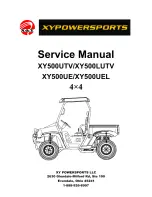
RIDING THE VEHICLE
mmo2008-003-005
Road Crossing
In some cases, you will be approach-
ing the road from a ditch or snowbank.
Choose a place where you know you
can climb without difficulty. Use the
standing position and proceed with
only as much speed needed to crest
the bank. Stop completely at the top
of the bank and wait for all traffic to
clear. Judge the drop to the roadway.
Cross the road at a 90° angle. If you en-
counter another snowbank on the op-
posite side, position your feet near the
rear of the vehicle. Remember, your
snowmobile is not designed to oper-
ate on bare pavement and steering on
this type of surface is more difficult.
Railroad Crossing
Never ride on railroad tracks. It is il-
legal.
Railroad tracks and railroad
rights-of-way are private property. A
snowmobile is no match for a train.
Before crossing a railroad track, stop,
look and listen.
Night Rides
The amount of natural and artificial
light at a given time can effect your
ability to see or to be seen. Nighttime
snowmobiling is delightful. It can be
a unique experience if you acknowl-
edge your reduced visibility. Before
you start, make certain your lights
are clean and work properly. Drive
at speeds that will allow you to stop
in time when you see an unknown or
dangerous object ahead. Stay on es-
tablished trails and never operate in
unfamiliar territory. Avoid rivers and
lakes. Guy wires, barbed wire fences,
cabled road entrances and other ob-
jects such as tree limbs are difficult
to see at night. Never drive alone. Al-
ways carry a flashlight. Keep away
from residential areas and respect the
right of others to sleep.
Riding in a Group
Before starting out, designate a “trail
boss” to lead the party and another per-
son to follow-up at the end of the party.
Ensure that all members of the party
are aware of the proposed route and
destination. Make certain that you are
carrying all necessary tools and equip-
ment and that you have sufficient fuel
to complete the trip. Never overtake
the trail boss or, for that matter, any
other snowmobile. Use down-the-line
hand signals to indicate hazards or in-
tent of direction change. Assist others
whenever necessary.
It is always IMPORTANT to keep a
safe distance between each snowmo-
bile. Always maintain a safe interval
and allow sufficient stopping distance.
Don't be a tailgater. Know the position
of the machine ahead.
Signals
If you intend to stop, raise either hand
straight above your head. A left turn is
indicated by extending your left hand
straight out in the proper direction. For
right turns, extend the left arm and
raise the hand to a vertical position so it
forms a right angle at the elbow. Every
snowmobiler should relay any signal to
the ones behind.
Trail Stops
Whenever possible, pull off the trail
when you stop. This will reduce the
hazard to other snowmobilers using
the trail.
________
SAFETY INFORMATION
________
21
Summary of Contents for Expedition LE
Page 9: ...SAFETY INFORMATION ________ SAFETY INFORMATION ________ 7...
Page 37: ...VEHICLE INFORMATION _______________ 35...
Page 87: ...MAINTENANCE _______________ 85...
Page 119: ...TECHNICAL INFORMATION ______________ 117...
Page 131: ...TROUBLESHOOTING ______________ 129...
Page 137: ...WARRANTY ______________ 135...
Page 151: ...CUSTOMER INFORMATION ______________ 149...
Page 154: ...CHANGE OF ADDRESS OWNERSHIP This page is intentionally blank 152 ______________...
Page 155: ...CHANGE OF ADDRESS OWNERSHIP ______________ 153...
Page 156: ...CHANGE OF ADDRESS OWNERSHIP 154 ______________...
Page 157: ...CHANGE OF ADDRESS OWNERSHIP ______________ 155...
Page 158: ...CHANGE OF ADDRESS OWNERSHIP 156 ______________...
Page 159: ...CHANGE OF ADDRESS OWNERSHIP NOTES ______________ 157...
Page 160: ...CHANGE OF ADDRESS OWNERSHIP NOTES 158 ______________...
Page 161: ...CHANGE OF ADDRESS OWNERSHIP NOTES ______________ 159...
Page 162: ...CHANGE OF ADDRESS OWNERSHIP NOTES 160 ______________...
















































